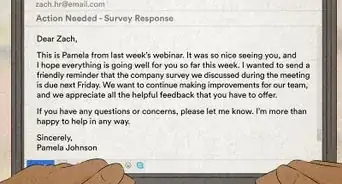This article was co-authored by Chloe Carmichael, PhD. Chloe Carmichael, PhD is a Licensed Clinical Psychologist who runs a private practice in New York City. With over a decade of psychological consulting experience, Dr. Chloe specializes in relationship issues, stress management, self esteem, and career coaching. She has also instructed undergraduate courses at Long Island University and has served as adjunct faculty at the City University of New York. Dr. Chloe completed her PhD in Clinical Psychology at Long Island University in Brooklyn, New York and her clinical training at Lenox Hill Hospital and Kings County Hospital. She is accredited by the American Psychological Association and is the author of “Nervous Energy: Harness the Power of Your Anxiety” and “Dr. Chloe's 10 Commandments of Dating.”
There are 14 references cited in this article, which can be found at the bottom of the page.
This article has been viewed 1,642 times.
Experiencing jealousy in a relationship can be stressful and difficult. You want to trust your partner, but for some reason you can’t. Maybe your stomach sinks when you see them talking to someone else, or you have the urge to read their texts while they’re out of the room. Jealousy can be harmful to a relationship, but the fact that you’re reading this article and wondering if your jealousy is normal or hurting your relationship shows your good intentions and true care for your partner. In this article, we’ll break down the difference between healthy and unhealthy jealousy and give you tips on how to confront your own jealousy and address your partner’s jealousy.
Steps
Is jealousy healthy in a relationship?
-
Yes—jealousy is a normal, human emotion. It’s an understandable reaction to realizing that you’re at risk of losing something or someone valuable to you.[1] X Research source When experienced healthily, jealousy is a good sign of a strong relationship. However, when experienced unhealthily, it can cause tension and resentment to build.[2] X Research source
Examples of Healthy Jealousy
-
1Mild and temporary jealousy. Mild jealousy is jealousy that doesn’t put a damper on the whole day. It passes quickly, and doesn’t need much attention from you or your partner. This feeling is completely normal, and an affirmation that you love and care about your partner. It shows your commitment to them, and your desire to keep them in your life.[3] X Research source
- If you feel a twinge of jealousy when your partner talks a bit long with someone else, don’t worry. This is a very common response. You’re scared of losing them, and are interpreting this new person as a threat. Remind yourself that this is just your perception, and often not reality![4] X Research source
-
2Jealousy you’ve communicated to your partner. Asking for reassurance and communicating with your partner not only shows you care for them, but also that you’re willing and able to work through your intricate feelings.[5] X Research source Talking with your partner also allows them to explain the situation from their point of view, and prevents any prolonged miscommunications.
-
3Jealousy you take responsibility for. Accept that you have vulnerabilities and triggers. Although it’s tempting to blame your partner for your jealousy by pointing out things they’ve done or people they’ve talked to, jealousy is more about you than them. Acknowledging the role you play in the situation is very important for moving past the jealousy.[6] X Research source
-
4Jealousy that motivates you to be a better partner. Jealousy can have positive effects on your relationship depending on how you act on your feelings. These complicated feelings can encourage you to reevaluate how you treat your partner, and help you brainstorm new ideas to show your affection.[7] X Research source
Examples of Unhealthy Jealousy
-
1Feeling jealous when your partner doesn’t spend all their time with you. Isolating your partner is not a remedy to your jealous feelings. Although this may make you feel better in the moment, it’ll only increase your anxiety when they’re away from you because you’ll associate trust with their nearness. Respect that your partner needs time to themselves to hang out with their own friends and family, and to enjoy their personal hobbies.[8] X Research source
- Pick up a hobby of your own, or make plans to meet up with your friends to give yourself something else to focus on. Waiting on your partner will only lead to more worrying!
-
2Monitoring your partner’s location because you’re jealous. It’s normal to want to check in with your partner, or to be concerned about their safety when they’re away, but avoid obsessively checking their location. Controlling behavior will push your partner away and strain the relationship.[9] X Research source
-
3Dictating who your partner can and can’t talk to. Your partner should change their actions on their own and because they want to. Micromanaging them will introduce tension and toxicity into the relationship. Trust your partner’s judgment, behavior, and the company they keep.[10] X Research source
-
4Doubting your partner when you have no reason to. If your partner is giving you no reason to be suspicious yet you are doubting them, there could be deeper issues of insecurity you have to confront within yourself. Trusting your partner is necessary in a relationship, and you won’t be able to move past your jealousy until you’re able to trust them.[11] X Research source
-
5Snooping through your partner’s things. Snooping adds secrecy and distrust into your relationship. Looking through your partner’s phone or email may be easier than having a tough, vulnerable conversation, but it’s a violation of privacy and is often unproductive.
- If you suspect your partner is lying or cheating on you, first ask yourself whether they’ve really given you reason to think they’re hiding something, or if you’re acting from a place of trauma or insecurity.[12] X Research source
- If you want to look through your partner’s phone just out of curiosity, there could be a breakdown in communication. Check in with your partner about sharing and re-connecting.
Confronting Your Own Jealousy
-
1Let go of the judgment and stigma around jealousy. Jealousy is often labeled as “bad” or “wrong”, and this causes many people to hide it in shame. However, jealousy can be a helpful tool for self-discovery. Be compassionate with yourself, and take the opportunity to get to know your vulnerabilities.[13] X Research source
-
2Journal about things that trigger your jealousy. Writing about the events that led up to your feelings of jealousy helps you to view the situation in an objective light. Try journaling about what happened, your immediate reaction/feelings, and the story you’re telling yourself about it.[14] X Research source
- “We were in line at the grocery store, and he was laughing a lot at the cashier’s jokes. I started comparing myself to her, and I wondered if I could make him laugh like that. He must like her more than me because she’s funnier.”
-
3Identify the insecurities at the root of your jealousy. Even if you don’t share them with your partner, you should know what insecurities were triggered. Be honest with yourself. Ask yourself where they came from and what kind of reassurance you need to move past your feelings of jealousy.[15] X Research source
- You might feel jealous when your partner compliments someone’s style because you’ve always been insecure about your fashion choices. To move past these jealous feelings, you might need a compliment!
Addressing Your Partner’s Jealousy
-
1Be patient with your partner’s feelings. Understand that working through jealousy is a slow process. Even after talking about it, it might take a while for your partner to let go of their jealousy. Take time to understand their feelings, be there for them, and continue to have thoughtful conversations about things that trigger them.[16] X Research source
-
2Change the behaviors that trigger your partner’s jealousy. If there are certain people or things you do that trigger your partner, try to avoid them. It takes two people to create a good, healthy relationship. Making small changes in your behavior and the company you keep lets your partner know that you take their feelings seriously, and prioritize them.[17] X Research source
-
3Reassure your partner that you are committed. Jealousy comes from a place of insecurity, so take time to let your partner know they’re the only one for you. Uplift them, and point out things that make them feel special and unique to you.[18] X Research source
-
4Negotiate boundaries to avoid future incidents. Jealousy will take some time to work through, and while you want to help your partner through it, you also shouldn’t neglect your own needs. Set boundaries so you’re able to see your friends and family or have alone time without causing an argument.[19] X Research source
- Don’t be afraid to respectfully call out your partner if they are acting jealous. The goal should be to move past the jealousy, not to continue it.
You Might Also Like
 33 Sweet & Romantic Apology Messages for Your Love
33 Sweet & Romantic Apology Messages for Your Love

 How Long Should I Wait to Text My Ex-Girlfriend?
How Long Should I Wait to Text My Ex-Girlfriend?
 How Long Does the No Contact Rule Take to Work?
How Long Does the No Contact Rule Take to Work?



 What Should You Do After Your Girlfriend Lies to You?
What Should You Do After Your Girlfriend Lies to You?
 How to Politely Remind Someone to Reply to You
How to Politely Remind Someone to Reply to You
 How Normal Is Fighting in a Relationship? Healthy vs. Toxic Fights
How Normal Is Fighting in a Relationship? Healthy vs. Toxic Fights



 How to Deal with Confusing People: 11 Ways to Navigate the Situation
How to Deal with Confusing People: 11 Ways to Navigate the Situation
References
- ↑ https://www.npr.org/2021/10/09/1044018004/jealousy-relationships-emotions
- ↑ https://www.marriage.com/advice/relationship/is-jealousy-healthy-in-a-relationship/#Is_jealousy_healthy_in_a_relationship
- ↑ https://www.npr.org/2021/10/09/1044018004/jealousy-relationships-emotions
- ↑ https://journals.sagepub.com/doi/10.1177/2158244013476054
- ↑ https://www.psychalive.org/how-to-deal-with-jealousy/
- ↑ https://www.psychologytoday.com/us/blog/sex-matters/201806/who-should-fix-jealousy
- ↑ https://journals.sagepub.com/doi/10.1177/2158244013476054
- ↑ https://www.joinonelove.org/learn/unhealthy-relationship-behaviors-series-jealousy/
- ↑ https://www.psychologytoday.com/us/basics/jealousy
- ↑ https://www.joinonelove.org/learn/unhealthy-relationship-behaviors-series-jealousy/
- ↑ https://www.joinonelove.org/learn/unhealthy-relationship-behaviors-series-jealousy/
- ↑ https://www.huffpost.com/entry/ok-to-check-partners-phone_n_5b6b68fbe4b0bdd0620628b1
- ↑ https://psychcentral.com/health/healthy-ways-to-deal-with-jealousy#avoid-judgment
- ↑ https://psychcentral.com/health/healthy-ways-to-deal-with-jealousy#identify-insecurities
- ↑ https://psychcentral.com/health/healthy-ways-to-deal-with-jealousy
- ↑ https://counselingwellnesspgh.com/how-to-deal-with-a-jealous-partner/
- ↑ https://centerstone.org/our-resources/health-wellness/jealousy-and-relationships/
- ↑ https://centerstone.org/our-resources/health-wellness/jealousy-and-relationships/
- ↑ https://www.huffpost.com/archive/ca/entry/dealing-with-jealous-partner-navigating_a_23702039
About This Article






























































